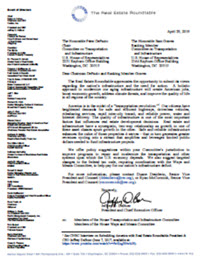A bipartisan bill reintroduced July 17 by Sens. Rob Portman (R-OH) and Jeanne Shaheen (D-NH) includes provisions to advance energy efficiency standards for U.S. real estate by fostering market incentives, data-driven research, and open government procedures.
 |
|
Roundtable President and CEO Jeffrey D. DeBoer, left, with Sens. Rob Portman (R-OH) and Susan Collins (R-ME) at a press conference to support the Energy Savings and Industrial Competitiveness (ESIC) Act. |
- Roundtable President and CEO Jeffrey D. DeBoer joined other industry and environmental group leaders at a press conference Wednesday in the Senate to support the Energy Savings and Industrial Competitiveness (ESIC) Act. (Video of DeBoer’s statement and entire press event)
- The ESIC Act is a revived version of comprehensive energy efficiency legislation introduced in prior sessions of Congress. (Bill summaryand text.)
- The Real Estate Roundtable has long endorsed the ESIC Act. The bill contains no mandatory federal building or climate-related regulations. It aims to improve energy efficiency across U.S. buildings by:
- Importing new economic, cost, and small business impact considerations into the process by which the U.S. Department of Energy (“DOE”) proposes revisions to “model” building energy codes, that state and local bodies may ultimately adopt;
- Providing stakeholders with opportunities to comment on code revisions suggested by DOE – to correct the currently closed process by which federal code proposals are developed without industry input;
- Clarifying standards for real estate appraisers and banks to consider energy efficiency capital investments when determining an asset’s market value; and
- Creating a voluntary program that can lead to lower interest rates and greater qualifications for buyers seeking mortgages on new energy efficient homes.

The Portman-Shaheen bill also includes new Section 103, strongly supported by The Roundtable.
- The Portman-Shaheen bill also includes new Section 103 , strongly supported by The Roundtable. This provision would require coordination by federal agencies to gather and report higher quality data on energy consumed by U.S. buildings, through the nationwide Commercial Building Energy Consumption Survey (CBECS). Data from CBECS provides the underpinning for EPA’s ENERGY STAR scores. (See Roundtable Weekly energy policy story above)
- In a July 18 Senate news release , 15 business and energy efficiency sector leaders expressed support for the latest Portman-Shaheen bill – including DeBoer and Henry H. Chamberlain, President and CEO, Building Owners and Managers Association (BOMA) International.
- DeBoer stated in the Senate news release, “The [ESIC Act] is exactly the kind of smart, forward-looking policy that will help building owners respond to our modern, evolving economy. The needs of business tenants have changed dramatically since the turn of the century to power the data centers, IT, and communications systems upon which our workforce depends. Building owners are meeting their tenants’ 24/7 energy demands while constructing and managing their assets more efficiently – and reducing their carbon footprints.”
- During the July 17 news conference, Sen. Portman added that the bill would save consumers $13 billion a year – the equivalent in emissions savings of taking 11 million cars off the road within 15 years. (Video of press event, July 17)
In a positive sign, a swath of energy efficiency bills are moving through both the Senate and House, indicating that energy policy could pass in a divided Congress. ( The Washington Examiner , July 18)









